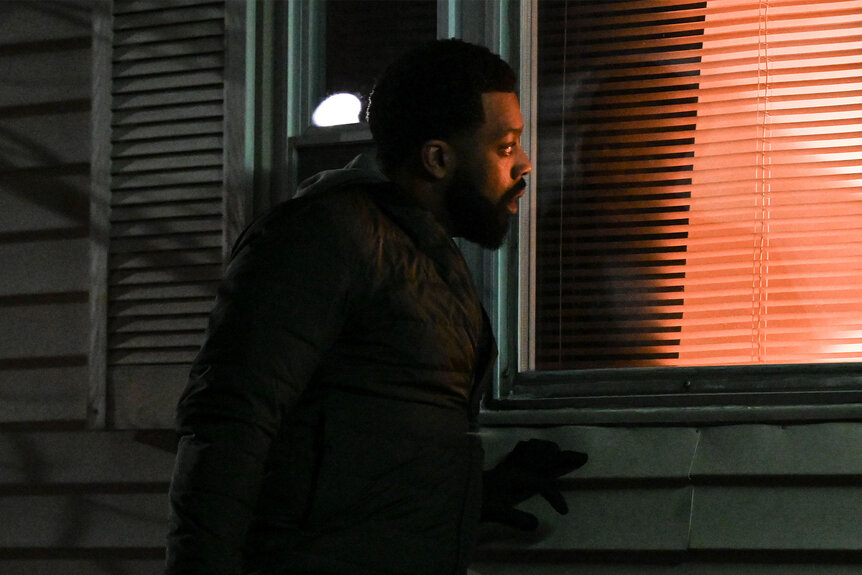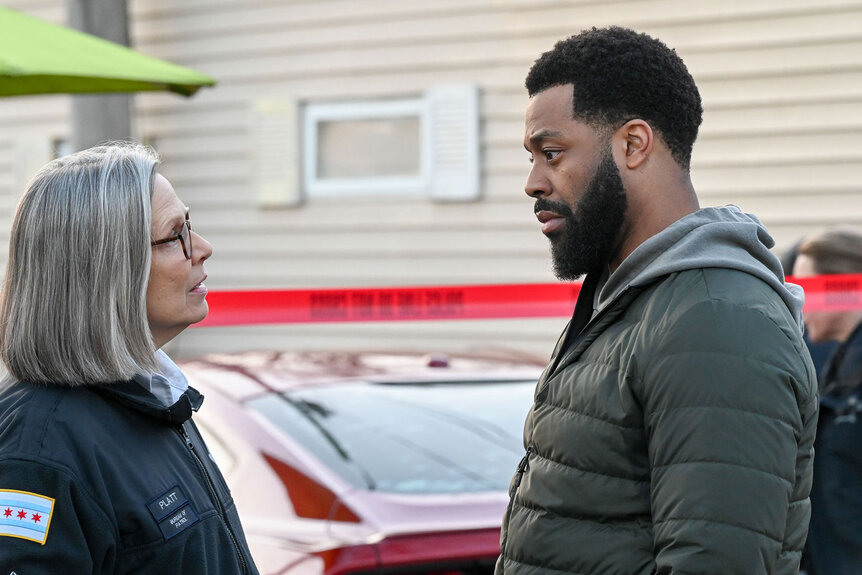Why Atwater Was Threatened with a Restraining Order on Chicago P.D.
The cop, played by LaRoyce Hawkins, got too close to the victims of an old robbery case.
While Atwater (LaRoyce Hawkins) tackled a brand new armed robbery case in Season 11, Episode 11 ("The Water Line") of Chicago P.D., he was clearly still haunted by the heist that went wrong in Episode 5's "Split Second." So much so it's revealed he's taken drastic measures to assuage his guilt.
Fans will remember that earlier this season, Atwater happened to be walking by a jewelry store when shots broke out. A survivor of the tragedy, Teresa Westbrook (Patrice Covington), was forced to watch her husband die from a gunshot wound as he was unable to get through a locked door to escape. Despite doing all he could, Atwater couldn't reach him in time to save his life amidst the chaos of the scene. He's full of regret throughout the episode — especially considering Teresa blames him for her husband's death.
At the end of the episode, Atwater returns to the scene of the crime and finds a key hidden under broken glass which could have potentially helped him reach Teresa's husband sooner.
RELATED: LaRoyce Hawkins Tears Up About Tracy Spiridakos' P.D. Exit: "She's Like a Sister"
"The key was really him finding that it had been there the whole time," showrunner Gwen Sigan told NBC Insider. "That he had just missed it. Had he been able to have more time, if he had had another second [or] have that scenario play out differently, he could have seen that key. He could have walked to that door, he could have opened it, and he could have been good. So it really was just to show that weight of what happened. And also that we're gonna see that weigh on him more."
She continued, "Those decisions you make in policing that honestly are a split second, and could go either way. And this one for him went a way that he regrets."
Fast-forward to "The Water Line," and we see Atwater has spent weeks hung up on the case — but not without consequences.
Why Atwater was threatened with a restraining order on Chicago P.D.
It becomes clear early on in Episode 11 that Atwater has secretly been keeping tabs on Teresa and her son. He even goes to the boy's school when a fellow cop tips him off that the young man is close to getting expelled. Atwater successfully saved him from expulsion but leaves before Teresa can see him — at least that's what we thought.
An angry Teresa later shows up at the station and confronts him, and even more of his secrets are revealed, including that he anonymously paid for her husband's head stone.
"When you showed up at my son's school, it all made sense. It all came together," she said. "The funeral concierge service that I didn't pay for, the meals and groceries that just showed up on my front door with no notes. The head stone. I don't want your charity...This man right here is trying to buy a clear conscience. You aren't getting absolution from me. And you will not get it from my son, either. If you ever come near my family again, I will file a restraining order, and I will make sure you lose your job. I promise that."
Later on, Platt (Amy Morton) also confronts Atwater and tells him he can't see the Westbrooks anymore, saying it's "eating you up."
RELATED: Chicago P.D.'s Production Designer Dishes About Where the Show Is Filmed
"Who is telling you not to care?" she says. "You're a good cop because you care. Sometimes I think you carry so much water. Your life, your job, your family, then you think, 'If I'm gonna stay afloat there is no margin for error,' but let me tell you something, you're not a machine...There are two things you can do with guilt. You can let it drown you, or it can give you purpose."
His response? "I gotta figure out how to do that."
Hawkins also gave more insight into his character to NBC Insider.
"What I've learned about redemption is that's what we relate to, and so as a storyteller, I had to allow Atwater to do some things that might not have looked like Atwater — but extremely redeemable in a way that the audience relates a lot more than they probably have in the past," the actor told us. "Just because I didn't wanna fall into the trap of being over righteous as a character, you know? I think sometimes it only contributes to one level of storytelling that sometimes isn't... as compelling."





















